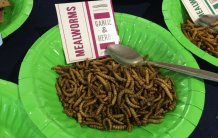Articles

Insect-based foods were served at the event
Edible insects: Mealworms on your menu?
Cricket brownies and “chocolate chirp cookies” were served at a meeting about the future of edible insects.
Insects are eaten in many parts of the world, and if people in countries such as the UK and US could get over the “yuk factor” it would open a “new frontier in food”, experts said.
Insects are a rich source of protein and can be produced using far less land and water – and with a far smaller carbon footprint – than meat such as beef.
Scientists, insect producers and other experts discussed the key issues at the University of Exeter’s Penryn Campus in Cornwall last week.
“We have got to stop seeing this as a novelty,” said Stefano Pascucci, Professor in sustainability and circular economy at the University of Exeter.
“Insects are commonly eaten around the world, but they’re not really part of the food culture in the West.
“If we could get over this disgust and neophobia (fear of new things) we could open a new frontier in food.”
Insect-based foods served at the event included both whole insects and products such as brownies, cookies and crackers.
The latter approach – where insects are not visible in their original form – might be more palatable to consumers, according to Dr Olivia Champion, founder of Entec Nutrition, which is based at the Penryn Campus and is developing insect-based foods.
“If you tried an insect-based food, could you tell the difference? Would you know what you were eating? Would you care?” she asked.
Dr Champion said mealworm production requires one twelfth of the food and 2,000 times less water than producing the same quantity of beef, with greenhouse gas emissions 100 times lower.
Insects can be fed on waste products such as used grain from breweries – another benefit both financially and environmentally.
Professor David Hosken, also of the University of Exeter, said sustainability is becoming increasingly important to today’s youth.
He said retailers will respond to customer demand – so insects could become a more common sight on the shelves of your local supermarket.
Ed Tomlin, Director of Six Feet Farms, which breeds crickets for food products, said insect-based food is a “fledgling industry” but he hopes his firm is “ahead of the curve”.
He said Six Feet Farms focuses on products made from cricket powder, as this helps avoid the “yuk factor” some people feel about eating insects.
The meeting, on December 12, also heard about the potential to increase the use of insects as feed for farm animals, including farmed fish.
This could reduce the use of soy beans, for which vast areas of land are used, and overfishing of krill to feed farmed fish such as salmon.
The Cornish Circular Economies: Edible Insects project is funded by the European Regional Development Fund and Agritech Cornwall.
Date: 18 December 2019
